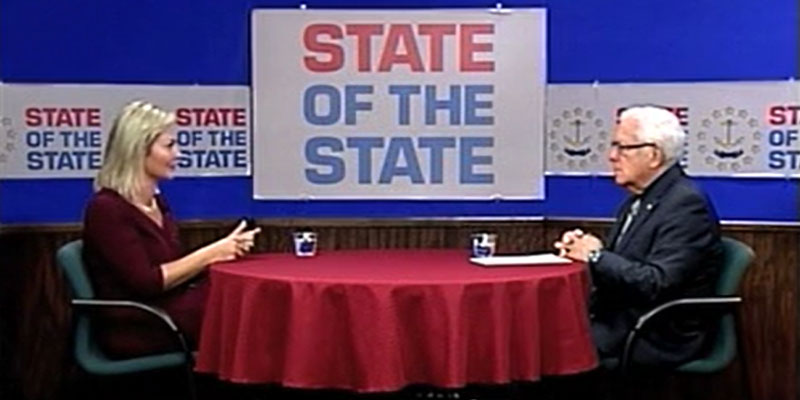I just saw a formerly conservative pundit agreeing with an always ridiculous advocate for rule by “experts” that the right is more prone toward and tolerant of violence. I honestly cannot understand how anybody could believe such a thing.
I mean, we could maybe have an interesting conversation about tendencies toward what we might call “masculine” and “feminine” violence, with the former being of the beat-you-up or shoot-you kind and the latter being of the lock-you-out-of-the-shelter or euthanize-you kind. Still, if I had to rank the two sides, I’d say the left is more dehumanizing and violent, but to state that the right is obviously more tolerant of violence seems blind.
But it occurs to me that maybe our impressions are like traffic. Have you ever arrived at work and complained about the traffic to somebody who arrived from the same general direction five minutes after you only for that person to claim that traffic had been unusually light? For whatever reason, you just happened to land in a pocket of traffic.
Maybe that explains some of this differing perspective.
[Open full post]On WNRI 1380 AM/95.1 FM, John DePetro and Justin Katz discuss:
- The mob in the Speaker’s House
- Rumors as news when they attack a Republican
- Dems for Kalus
- Magaziner imports support from D.C.
Featured image by Arisa Chattasa on Unsplash.
[Open full post]Why are Rhode Island parents so lackadaisical about the poor value they’re getting from the state’s government schools? As Dan McGowan reports, SAT scores are down from where they were before the pandemic, and they were already low compared with those of neighboring states:
Math (minimum score of 530 out of 800): 25.3 percent
English language arts (minimum score of 480 out of 800): 47.1 percent
By comparison, 31.2 percent of students were considered proficient in math in 2019, and 50.5 percent were considered proficient in English language arts.
When it comes to overall scores in math and English language arts, the average Rhode Island student scored 971. In Massachusetts, the average was 1,129. In Connecticut, it was 1,025.
When I looked at SAT scores in Rhode Island compared with those of other states in which a majority of students take the SATs in 2015, I found the Ocean State public schools performed worse. I also found that our private, religiously founded schools performed as well as or better than similar schools in other states (much higher than public schools, in both cases), and that a larger percentage of Rhode Island families choose that option than elsewhere (18% versus 8%).
My conclusion at the time was that Rhode Islanders were using the relatively low-cost religious (mostly Catholic) schools as a form of school choice, and their children were benefiting from that choice.
So, how is it that Rhode Island parents aren’t storming school committee meetings and demanding improvement? Let’s take ideology and partisanship off the top of the analysis, with many families going along with the establishment Democrats because they are caught up in a shared belief system and/or benefit financially from the status quo.
Addressing the problem is an intimidating prospect, given how locked in Rhode Island’s governing system is, and to acknowledge how bad things are would be to acknowledge a responsibility to address the fact that your children are being deprived of an adequate education. Many parents, upon coming to this conclusion, simply take their children out of Rhode Island’s government schools, either by moving out of state or paying a little bit more for education in a private school.
Featured image by Vahid Moeini Jazani on Unsplash.
[Open full post]Guest: Ashley Kalus, Candidate for Governor, https://ashleykalus.com
Host: Richard August
Description: Kalus asserts that she will fight for Rhode Island and it citizens to make the state affordable to live in with high performing schools for its children, parents and teachers. She provides an overview of the partnership she will develop to improve schools, which shall include public school choice. Other topics discussed include: guns laws; Second Amendment rights; mental health concerns; abortions rights; illegal resident driver permit rather than license; and more.
One despairs of our ever coming together if we live in two separate realities. Many details of the attack don’t make sense, starting with the fact that the Pelosi’s home is apparently so vulnerable and the fact that calling somebody a “friend” to 911 is apparently a code that we’re all supposed to know, let alone that Pelosi reportedly managed to get to the bathroom for a phone call but didn’t lock himself in there.
On the other side, some of the details being promoted may be the fog of early reports. For example, regarding the fact that somebody let the police in, it’s entirely possible that Pelosi got to the door to open it and that act initiated the struggle the police witnessed when they entered.
Of course, if the incident was a collision of a crazy person with an inebriated person in the middle of the night, we have to leave allowances for a lot of strangeness. There’s a whole lot of space for this story between a hammer-armed nudist MAGA assassin and a gay tryst gone wrong.
That’s why the most disturbing aspect may be Democrats’ immediate rush to make it a political hit against their enemies. We can’t possibly function as a society when every incident is immediately leveraged to split us into competing realities.
[Open full post]As with myriad issues, many of them related to COVID-19, we’re seeing an instant demand that we accept the approved narrative so zealously that confounding details cannot be considered, with disagreement, or even doubt, being framed in entirely partisan terms. This doesn’t necessarily mean the 180-degree opposite narrative is correct, but it does mean we can’t trust what we’re being told.
[Open full post]John Loughlin interviews Dr. Shafman, Colonel Ray Deniswich of VFW Post 272, and Executive Director Meghan Grady of Meals on Wheels.
[Open full post]I’m also seeing RI Democrats attempting to raise money with emails saying things like:
Ashley Kalus is no imaginary monster …
We have to stop her from gaining any power in Rhode Island and trying to drag us back into a terrifying past with less freedom.
Remember that the people who write these messages probably aren’t unable to see what they’re doing, which means they think you are.
[Open full post]One person was seeking Justice Kavanaugh with a gun. It is perfectly reasonable to ask, “what about,” now, as progressives and Democrats behave as if an attack on the Speaker of the House’s husband is not only the most outrageous event in recent memory, but also a direct consequence of “MAGA Republican” rhetoric.
[Open full post]A recently released book by Gale Pooley and Marian Tupy, Superabundance, explores the amazing fact that the prosperity and the availability of scarce resources is proving only to increase as the population grows. Their most fundamental argument is that people have value. Every child added to the world increases the wealth of all of us.
The authors don’t mean that as a religious or philosophical claim, although it’s accurate in that context, too, but as an economic one. In fact, they find that new people don’t just cover their own price of existence, so to speak, but generate additional wealth.
The topic reminds me of my early attempts to take economics seriously. I searched in vain for a definition of “the economy” that could imply a total existent and potential sum, sort of like one can estimate the total kinetic and potential energy in a system. Finding no satisfactory answer, I started thinking it through from the bottom up. Begin with a single person, who brings value into the world as an entity who values goods and services and provides value through productive activity. Add in another person, and their combined value is greater than their sum as individuals.
Just so, more people will always increase the economy… unless they are prevented from finding ways to provide value to each other. Maybe the most fundamental (and offensive) swindle of socialism is its claim to be humanistic and to reduce alienation while dehumanizing everybody and alienating them from each other.
The central planning prevents us from finding ways to coordinate, solve problems, and create a cooperative new world. The central planners try to force the human system into a scheme that makes sense to them, as central planners, without taking any account of that which people value and how particular individuals can best create value for others.
Being charitable, we might observe that socialists cannot possibly have sufficient information to place everybody perfect (and never mind the all-too-human fact that people tend to prefer conclusions about their purpose to which they feel they come themselves, without being instructed). Being less charitable (although perhaps no less correct), we might also observe the defining trait of socialists to be their unhappiness with the choices people actually make when left to their own devices.
And so, we hear about a 9.6% increase in natural gas prices in Rhode Island (kept low, we can be sure, by political bullying) even as the State of Texas has such a glut of natural gas that the prices have fallen below zero. That means it makes more economic sense for producers to burn gas in Texas rather than try to get it to consumers in Rhode Island.
Beyond raising their go-to specter of climate change, the meddlers find this sort of activity incomprehensible, but it is the result of their meddling. Such disconnects don’t just happen. They result from foolish policy — from progressives’ standing in the way of people finding ways to serve one another. Note, for example, that resisting so-called “gouging” in New England prevents the value of transporting energy here from overcoming the cost of doing so.
The sorts of people who make political decisions in places like Rhode Island may believe this situation to be preferable to continued reliance on fossil fuels, but in that case, they ought to be honest about their calculations. They can’t be honest, though, because they know that they’d have few supporters. Instead, they distract and spin narratives about how people are a cancer on the planet and there are too many of us anyway.
Featured image by Mike Benna on Unsplash.
[Open full post]





